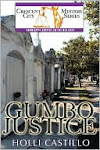Just as I am finished editing Jambalaya Justice, the second in the Crescent City Mystery Series and follow up to Gumbo Justice, I saw on the news that one of the New Orleans police officers originally convicted in relation to a police-Katrina murder has had his conviction overturned and has been granted a new trial. The feds are reviewing the federal judge's decision to determine if they will re-try him or not.
I have blogged about this particular murder before. There were five officers, some rank, allegedly involved. During the aftermath of Katrina, when the police had set up makeshift district offices, a rookie sharpshooter was accused of shooting a civilian who was attempting to approach the office. Two other officers were accused of taking his body from his brother and another individual who were attempting to save him, and burning it. Another officer was accused of writing and filing a false police report and then lying to federal agents about it, and finally, a rank was accused off intentionally not tying the three separate incidents together and realizing it was a scheme to cover a murder. The sharpshooter was convicted, as was one of the officers who burned the body. The officer accused of the cover up for filing a false report was the third convicted, and the one whose conviction has now been overturned.
The last guy happens to be a friend of mine. His wife and I were assistant district attorneys together in the late 1990's. He was a police officer even then, which is how they met, and he actually arrested my brother-in-law once for possession of marijuana. Travis, the officer, always seemed to me to be a straight shooter who played by the rules. He certainly didn't offer any leeway for my brother-in-law after finding out who he was.
When Travis was convicted, I was upset. I could only imagine what his wife was going through, and while I could picture Travis following an order someone gave him, I couldn't imagine him intentionally doing something on his own like hiding the truth about a murder. But I wasn't there, and Katrina was an unprecedented event and I can't swear as to how anybody will act under those type of conditions.
When he was first convicted, I had to believe everything would work out. I am an appellate public defender now, an officer of the court, and probably lean a little hard on making sure individuals' rights are not violated. It's been my job for the past 11 years, so it's ingrained in me at this point.
In Travis' case, he has maintained from the beginning that he assisted a ranking female officer with the writing of the report, and the factual basis was not his own, but hers. She testified for the prosecution, changing her testimony more than once. She was caught in several lies, and given complete immunity as far as the murder. Immediately after her testimony, she took early retirement from the NOPD, for which she was still employed. One of the biggest issues was the original report that she wrote. She claimed the original report was altered by Travis, but for some reason she had not kept a copy of that original report. Soon after the trial, one of the acquitted officers submitted what he said was the original police report written by the female rank, which shows the report eventually submitted was not altered by Travis. The prosecution tried to argue the report was a fake, but offered no proof to that. The judge found that if the original police report had been provided to the jury, the jury would have acquitted Travis, which is the standard for newly discovered evidence. While the rank who eventually provided the report may have been holding out on providing the report, perhaps fearful he would be convicted and would need the report to get a new trial himself, his failure to provide the report, for whatever reason, was not the fault of Travis. Obviously, if Travis would have had access to the smoking gun that would have exonerated him, he would have used it at trial.
It so happens my mystery series revolves around a prosecutor and the dysfunction of the New Orleans criminal justice system, that somehow usually ends up rendering justice if not necessarily fairness or what is right. Obviously, the two concepts are not the same. Justice requires a trial without legal errors, not one that ultimately results in the guilty getting convicted and the innocent going free, although those should be desired results. The belief that only those, and all of those, who deserve punishment are punished, is childish. The law doesn't require perfection. It only requires that nobody cheats or makes a mistake during the process.
So seeing that two of the individuals involved were convicted and their convictions upheld, two others were acquitted by the jury, and one was convicted and his conviction set aside, all I can think is that the premise and theme behind my Crescent City Mystery Series is correct, that things maybe eventually do work out the way they are supposed to, even if sometimes they need a little help.









1 comment:
Good readiing your post
Post a Comment